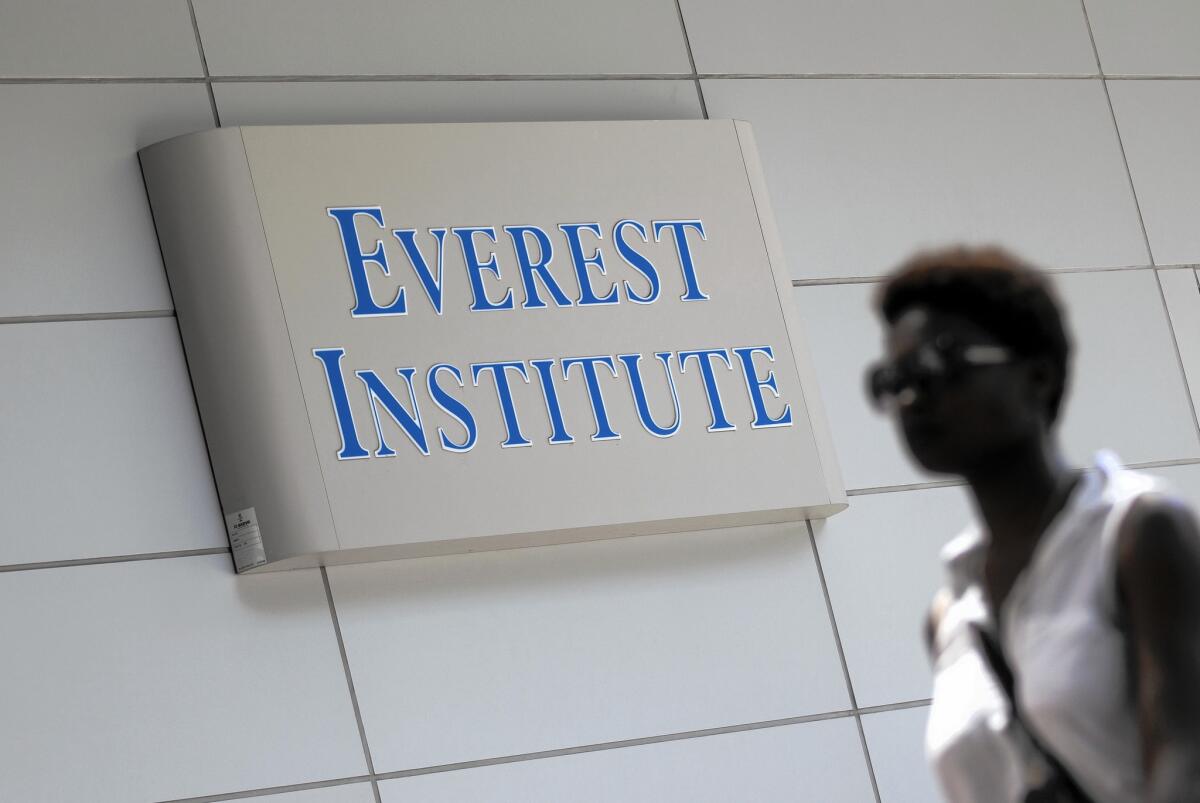Corinthian students to get 40% cut in private loan debt

- Share via
For years, government investigators have zeroed in on Corinthian Colleges Inc., a Santa Ana for-profit college operator accused of roping students into unmanageable debt by promising bright careers after graduation.
As part of a deal Tuesday that finalized the sale of more than 50 Corinthian schools, students are getting a reprieve.
As many as 170,000 students who took out private loans offered by Corinthian will see an immediate 40% reduction in their balances — about $1,880 on average — with additional reductions likely in the future. All students will see a 20% tuition reduction. And those enrolled in poor-performing programs can seek a full refund or transfer into another program.
“It will be real and meaningful relief for tens of thousands of students,” said Pauline Abernathy, vice president of the Institute for College Access & Success, an Oakland nonprofit that advocates on student debt issues.
But the $480-million private loan forgiveness program doesn’t go far enough, she said.
It does not apply to federal loans, which make up the vast majority of debt held by former and current students at Corinthian. A Corinthian spokesman estimated that the average loan balance for the company’s private loans is $4,700 per student, whereas median federal loan debt for Corinthian’s Everest College programs in Southern California ranged from $9,000 for a dental assistant program to $28,000 for a criminal justice degree, according to school disclosures.
The average price at one of Corinthian’s Everest campuses in Southern California is $20,000 to $25,000 per year, according to federal data.
“If these students were enrolled based on misrepresentations and fraud, we believe they should have those federal loans discharged as well,” Abernathy said.
Corinthian has been on a downward spiral since last summer, when the U.S. Department of Education restricted its access to federal student aid amid concerns that the company had falsified student job placement data. Since federal student loan and grant money make up nearly 85% of Corinthian’s revenue, the company suffered a severe cash crunch.
As part of a deal with the Education Department in July, the company agreed to sell off most of its campuses and close down the rest.
Meanwhile, Corinthian’s private student loan venture, known as the Genesis loan program, was attracting scrutiny from federal regulators and state attorneys general. The U.S. Consumer Financial Protection Bureau sued Corinthian in September, alleging that the program amounted to an “illegal predatory lending scheme.”
The consumer bureau argued in a federal lawsuit that Corinthian steered students into the high-interest private loans to help meet a federal law requiring that colleges get at least 10% of revenue from private sources.
To come up with that money, the college hiked tuition above federal aid limits — prompting students to seek additional private loans from Corinthian. The suit alleges that Corinthian harassed students into repaying debts while in school, sometimes preventing them from graduating. Nearly 60% of borrowers defaulted within three years, according to the suit.
In November, Corinthian announced that ECMC Group, a nonprofit student loan servicer, would purchase 56 of its schools, excluding those in California and some other Western states.
ECMC wanted to avoid any potential liability surrounding the consumer bureau’s lawsuit. It worked with the third-party financial institution that owns the loan portfolio to negotiate payments that would allow for major loan forgiveness. The deal announced Tuesday will shield ECMC from any liability, although the suit against Corinthian will go forward.
A Corinthian executive vice president, Stan Mortensen, praised the deal in a statement but disagreed with the “unfounded and unproven charges” from the consumer bureau. The company said it will continue to fight the suit.
In addition to the immediate reduction in loan balances, ECMC and the consumer bureau are also working to erase records of the private loans from students’ credit histories, and to ensure that debt collectors can’t sue for unpaid balances.
Students should automatically see their balances reduced by their loan servicers, according to the consumer bureau.
Patricia Phillipes attended the West Los Angeles campus of Everest College to start a new career as a pharmacy technician, after an injury and the recession upended her personal training business. Nearly two years after she graduated, the 65-year-old has no job and said she’s saddled with about $20,000 in student debt — including roughly $9,500 outstanding on the private Genesis loan.
The 40% reduction would bring that balance to about $5,700. But she’s been unable to find a job in her field, relying on about $1,500 a month from Social Security and a pension, along with assistance from her partner, who lost his job in December.
“It’s not going to help,” Phillipes said of the reduction. “We can’t afford the loans at all. I have a mortgage. We have car payments. We have utilities.”
She’s currently on forbearance for the private loan, paying a minimal amount of $25 per month — far shy of the roughly $170 required.
As part of the final sale Tuesday, ECMC Group also announced plans to lower tuition costs 20% and give some 40% of current students the option for a refund. Those terms do not apply to students at Everest and WyoTech schools in California, along with Heald College students, which are not part of the sale and are still owned by Corinthian.
Students enrolled in programs found to have low job-placement rates will have the option to either transfer into another program or withdraw and receive a full refund.
Under the original deal announced in November, far fewer students would have the option for refunds.
David Hawn, chief executive of ECMC Group, said the group believed that it was only fair to give students the choice to back out of programs that wouldn’t lead to meaningful job opportunities. In the meantime, he said the group is limiting enrollment in programs where there isn’t enough local demand in the job market.
“This has the potential to be very expensive for us, and we’re willing to do it,” Hawn said. “We see this as a long-term play, not a short-term one.”
Twitter: @c_kirkham
Times staff writer Andrew Khouri contributed to this report.
More to Read
Inside the business of entertainment
The Wide Shot brings you news, analysis and insights on everything from streaming wars to production — and what it all means for the future.
You may occasionally receive promotional content from the Los Angeles Times.











